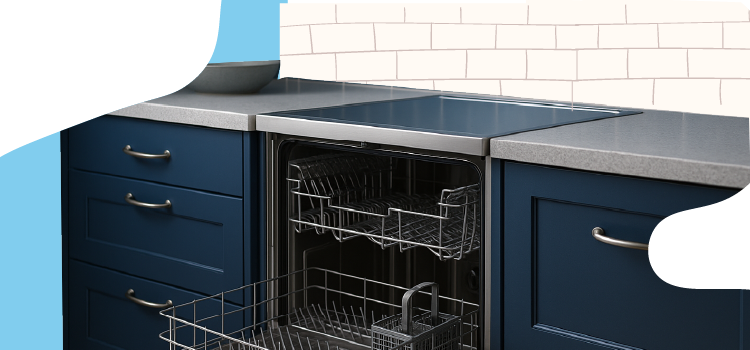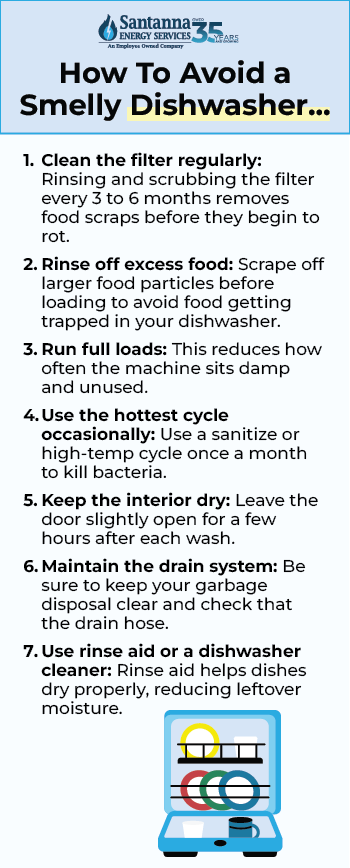Why Does My Dishwasher Smell? Causes and Easy Fixes for Homeowners
by Jenna Mendez
15.6 min read

You load the dishes, press start, and expect sparkling clean plates. Instead, when you open the door, you’re hit with a foul odor that makes you wonder: Why does my dishwasher smell?
If this sounds familiar, you’re not alone. Nearly every homeowner experiences dishwasher odors at some point, and while they can be embarrassing, they’re also a warning sign.
A smelly dishwasher isn’t just about unpleasant scents. If left unchecked, these issues don’t just affect how your kitchen smells. They can also make your dishwasher run less efficiently, wasting energy and water every time you press start.
The good news is that fixing it is easier than you think. In this guide, we’ll break down the most common causes of dishwasher odors, show you quick and effective fixes, and share simple maintenance tips to keep your appliance fresh, efficient, and energy-smart year-round.
Key Points of This Article:
- Food, grease, and moisture left behind after cycles are the top causes of dishwasher odor.
- A rotten egg smell usually means sulfur gases from bacteria in trapped water or minerals.
- Persistent odors tied to your water supply or drainage may require a plumber to check the water heater, pipes, or drain system.
- Dirty dishes after a cycle often point to a clogged filter, blocked spray arms, or poor water flow.
How a Dishwasher Works
Think of your dishwasher as a smart kitchen helper that uses hot water, detergent, and pressure to clean your dishes in stages: wash, rinse, and dry. Here’s how a dishwasher works behind the door:
Step 1: Filling and Heating
The cycle begins when a small valve opens to let water flow into the bottom of the dishwasher. A heating element then raises the water temperature, usually to 120°F–160°F. This hot water is essential because it dissolves detergent and breaks down grease and food particles more effectively.
Step 2: Washing
At just the right time, the detergent compartment releases soap into the hot water. A circulation pump then pushes this soapy water through spinning spray arms, which spray from multiple angles to knock food off your dishes.
The dirty water collects at the bottom, where a filter catches particles. To save water, many dishwashers recirculate and filter this wash water several times during the cycle.
Step 3: Draining and Rinsing
Once the wash cycle ends, dirty water is pumped out into your kitchen drain. Fresh water then enters the tub to rinse away loosened food and leftover detergent.
If your dishwasher includes a rinse aid dispenser, it releases a small amount during this step to reduce water spots and help dishes dry faster.
Step 4: Drying
In the final stage, some dishwashers use the heating element again to warm the air, speeding up evaporation.
Newer energy-efficient models often use condensation drying: the dishes are heated during the last rinse, and as they cool, the moisture condenses on the cooler stainless-steel walls and drains away, leaving your dishes dry without extra electricity.
Why Does My Dishwasher Smell? The 10 Most Common Reasons
The most common causes of dishwasher odor stem from food, grease, and moisture that remain after each cycle. Over time, these issues create the sour, musty, or even rotten-egg smell that greets you when you open the door. Here are the most common things that make a dishwasher smell:
1. A Clogged/Dirty Filter
Modern dishwashers are equipped with fine mesh filters that trap crumbs and food scraps, preventing them from recirculating onto your dishes. If the filter isn’t cleaned every few weeks, that buildup starts to rot and smell.
A dirty filter also restricts water flow, making your dishwasher less efficient and potentially leading to higher energy bills.
2. Food Scraps
Even small particles like rice, pasta, or bits of meat can get stuck in the bottom sump, spray arms, or corners of the tub. Left behind in a warm, damp environment, these food scraps break down quickly and give off strong odors.
3. Grease Buildup
Cooking oils and greasy residue often cling to the walls of the dishwasher or collect around the filter. Grease traps food particles, making them harder to wash away and creating a sticky film that becomes a source of lingering smells.
4. Mold and Mildew
Dishwashers stay damp between cycles, especially if the door is closed tightly. That moisture is the perfect breeding ground for mold and mildew along the rubber door gasket, racks, and hidden corners. Musty, earthy odors are a clear sign.
5. Clogged Drain
If your dishwasher doesn’t drain completely, dirty water may sit in the bottom of the tub or flow back in from the sink. A clogged drain hose, blocked garbage disposal, or missing high loop can all cause sewer-like smells.
6. Soap Scum and Residue
Using too much detergent, or the wrong kind, can leave behind soap scum. Combined with hard water minerals, that residue builds up on spray arms, walls, and filters. Besides creating odors, soap scum reduces water flow and makes your dishwasher less effective.
7. Low Water Temperature
If your dishwasher isn’t getting hot enough (usually 120°F or higher), grease and bacteria don’t fully break down. This can leave both odors and cloudy residue on dishes.
8. Hard Water Mineral Deposits
In many Midwest homes, hard water leaves behind calcium and magnesium buildup. These deposits trap food and detergent, making it harder for the machine to stay clean and odor-free.
9. Poor Air Circulation
Always closing the dishwasher immediately after a cycle keeps moisture sealed inside. Without airflow, mold, mildew, and bacteria multiply, leaving behind a stale smell.
10. Old or Worn Seals
If your dishwasher is older, the door gasket or internal seals may wear down. Worn seals can trap debris and moisture or fail to keep wastewater from seeping into hidden areas, which leads to persistent odors.
What Kind of Smell Are You Dealing With? And What That Smell Means
Not every dishwasher smell is the same. The odor you notice can point to a specific problem, and once you identify it, you’ll know exactly what to do. Here are the most common smells and their fixes:
Musty or Mildew Smell
A musty or mildew dishwasher smell usually comes from mold or mildew growing in damp areas like the rubber door gasket or hidden corners of the tub. Because dishwashers stay warm and humid after cycles, these areas can trap moisture and breed bacteria.
Wiping down the gasket and tub, then running a hot cycle with vinegar or bleach, helps eliminate the smell. Leaving the door slightly open after each wash prevents it from coming back.
Rotten Egg or Sulfur Smell
A rotten egg or sulfur-like smell is typically caused by bacteria in standing water or sulfur coming from your hot water supply. The odor comes from hydrogen sulfide gas, which thrives when water sits too long.
Cleaning the filter and drain area often helps, but if the smell is also present at your faucets, you may need to have your water heater inspected for a corroded anode rod.
Fishy or Meat-Like Smell
A fishy or meat-like dishwasher smell points to protein-rich food scraps, such as meat, eggs, or seafood, that are stuck in the filter or sump. These particles break down quickly in a warm, moist environment and create a strong odor.
To fix this, remove and rinse the filter, scrub the sump area with warm soapy water, and run a cycle with an enzyme-based cleaner to break down any residue.
Sewer or Wastewater Smell
A sewer or wastewater dishwasher smell usually means there is a drainage issue that allows dirty water to flow back into the machine. This can happen if the garbage disposal is clogged, if the drain hose is blocked, or if the hose is missing a high loop or air gap.
Clearing the disposal, checking the drain hose, and making sure the installation includes proper backflow protection will solve most of these problems.
Burning or Plastic Smell
A burning or plastic smell is more serious and should be addressed right away. Often, this happens when a plastic utensil or container has slipped onto the heating element and started to melt during a cycle. In rare cases, it can indicate an electrical issue.
Stop the dishwasher immediately, check the bottom for melted debris, and remove anything that doesn’t belong. If the smell continues, call a technician before running the appliance again.
Why Does My Dishwasher Smell Like Rotten Eggs?
If your dishwasher smells like rotten eggs, the source is often related to sulfur gases that form when bacteria interact with trapped water or minerals. This can happen when hot water from the supply line carries sulfur bacteria into the appliance, or when standing water inside the machine begins to break down and release foul odors.
If you live in an area with hard water, mineral buildup can make the problem worse by trapping food residue and bacteria. As unpleasant as it is, that rotten egg smell is actually a warning sign. It’s your dishwasher telling you it might not be draining properly or sanitizing the way it should, which affects both how clean your dishes get and how efficiently the machine runs.
The good news is that tackling it right away not only gets rid of the odor but also keeps your dishwasher working smoothly and saves energy by preventing repeat washes.
Why Do My Dishes Come Out of the Dishwasher Dirty?
When dishes come out of the dishwasher still dirty, it usually means the machine isn’t able to spray, drain, or heat water the way it should. A clogged or dirty filter often keeps food particles from being fully removed, while blocked spray arms stop water from reaching every surface.
If you’re in an area with hard water, like Chicago, Illinois, mineral deposits can build up and reduce the power of the wash cycle, leaving a cloudy film on glasses and plates. Low water temperature is another common issue because if the water never gets hot enough, grease and detergent don’t break down properly.
In some cases, loading too many dishes or blocking the spray arms prevents water from circulating evenly. The result is the same: dishes that look and feel unwashed, even after a full cycle. Fixing these issues not only improves cleaning but also helps your dishwasher run more efficiently, saving you from wasted energy on repeat washes.
How To Clean a Dirty Dishwasher
If your dishwasher has started to smell or leave dishes less than spotless, it’s time for a deep clean. Learning how to clean a dirty dishwasher is easy and removes food, grease, and buildup that cause odors, while also helping it run efficiently.
Step 1: Clean the filter
Start by removing the bottom rack and lifting out the filter. Rinse it under warm water and scrub with a soft brush. A clogged filter is the top cause of odors and also makes your dishwasher less efficient, according to Consumer Reports.
Step 2: Clean the interior
Wipe the inside walls, racks, and corners with warm, soapy water or vinegar. Grease, soap scum, and detergent buildup trap odors, so keeping the interior clean is key.
Step 3: Inspect door gaskets
Check the rubber door gasket for food, mold, or grime. Wipe it with a damp cloth and mild cleaner. Gaskets often hide mildew, which leads to musty smells.
Step 4: Run a cleaning cycle
Place a cup of vinegar on the top rack and run the hottest cycle, or use a dishwasher cleaner. For extra freshness, sprinkle baking soda on the bottom and run a short cycle.
Step 5: Address the drain
Clear the garbage disposal, then check the drain hose for clogs or kinks. Poor drainage leaves dirty water behind, which is a common cause of bad smells.
Final Step: Keep it dry
After cleaning, leave the door slightly open so the interior can air out. Proper airflow prevents moisture from feeding bacteria and mold, helping your dishwasher stay fresh longer.
How To Avoid a Smelly Dishwasher
The best way to deal with dishwasher odors is to stop them before they start. With just a little regular care, you can keep your appliance smelling fresh, your dishes sparkling clean, and your kitchen free of unpleasant odors.
Here are simple steps you can follow:
1. Clean the filter regularly
One of the most effective ways to avoid a smelly dishwasher is to clean the filter on a consistent schedule. Rinsing and scrubbing the filter every 3 to 6 months, or more often if you run daily cycles, removes food scraps before they begin to rot. This not only prevents odors but also helps your dishwasher clean more efficiently.
2. Rinse off excess food
You don’t need to pre-wash dishes completely, but it’s a good idea to scrape off larger food particles before loading them into the dishwasher. Less food going into the dishwasher means fewer scraps getting trapped inside, which reduces the chance of odor-causing buildup.
3. Run full loads
Wait until the dishwasher is full before starting a cycle. This saves water and energy while reducing how often the machine sits damp and unused.
4. Use the hottest cycle occasionally
If you usually run eco or quick cycles, use a sanitize or high-temp cycle once a month. This kills bacteria and breaks down grease that lower temps can leave behind.
5. Keep the interior dry
Moisture left behind after a cycle is one of the main reasons for mold and mildew growth. To avoid this, leave the door slightly open for a few hours after each wash. Allowing air to circulate inside keeps the tub dry and your dishwasher smelling fresh.
6. Maintain the drain system
Your dishwasher is only as clean as its drainage. Be sure to keep your garbage disposal clear since most dishwashers connect through it, and check that the drain hose has a proper high loop or air gap. This setup prevents wastewater from flowing back into the dishwasher and causing sewer-like odors.
7. Use rinse aid or a dishwasher cleaner
Rinse aid helps dishes dry properly, reducing leftover moisture. A monthly cleaning cycle with vinegar, citric acid, or a commercial cleaner helps control soap scum and hard water buildup.
Can You Use Dish Soap in a Dishwasher?
No, you should never use regular dish soap in a dishwasher. Unlike dishwasher detergent, liquid dish soap creates lots of suds, which can overflow onto your kitchen floor, damage the appliance, and clog the filter and drain system.
You should only use dishwasher detergent in your machine because it’s specially made for dishwashers. It’s formulated to break down food and grease effectively without creating the kind of suds that can cause problems inside the appliance.
If you accidentally use dish soap, stop the cycle right away. Remove as much foam as you can, then run several rinse cycles. Adding a cup of white vinegar during a rinse can help break down the suds and clear the machine.
When Should I Call a Plumber About Dishwasher Smells?
Most dishwasher odors can be fixed with regular cleaning, but sometimes the problem points to a bigger plumbing issue. You should call a plumber if:
- The smell is like sewage and keeps coming back even after you’ve cleaned the filter, interior, and drain area. This often signals a blocked or improperly installed drain line.
- You notice standing water at the bottom of the dishwasher after a cycle has completed. That means wastewater isn’t draining correctly and may be backing up.
- Other drains in your kitchen also smell bad at the same time. This could mean your sink drain, garbage disposal, or even your home’s main plumbing line has a clog.
- You see leaks or water damage around the dishwasher area. This is a red flag that wastewater isn’t moving through the pipes the way it should.
If the odor is linked to your water supply, like a rotten egg smell from sulfur, it may also require a plumber to inspect your hot water heater or pipes. If smells keep coming back after you’ve done a thorough cleaning, or if they’re paired with drainage issues, call a plumber right away.
FAQs
How often should I clean my dishwasher filter to prevent smells?
Most manufacturers recommend cleaning the filter every 3–6 months, depending on how often you run your dishwasher. If you notice odors or dirty dishes, clean it more frequently.
How do I know if the smell is coming from my dishwasher or my kitchen sink?
Run water down your sink and garbage disposal first. If the odor appears there, the problem is in the sink drain. If the smell only comes when you open the dishwasher after a cycle, it’s likely from inside the machine.
Can a clogged garbage disposal make my dishwasher stink?
Yes. Most dishwashers drain through the garbage disposal. If the disposal is clogged with food scraps, the dirty water can back up, causing foul odors in your dishwasher.
Could my drain hose or air gap be the reason my dishwasher smells?
Absolutely. A clogged drain hose or a missing/blocked air gap can allow wastewater to flow back into the dishwasher, creating a sewer-like smell. Plumbing codes require a high loop or air gap to prevent this.
Why does my dishwasher smell even after cleaning?
If odors persist, it may be due to drainage problems, hard water buildup, or bacteria in the water supply. In some cases, the hot water heater is the source (sulfur smell from a corroded anode rod). A deep clean plus plumbing check may be needed.
Is vinegar safe for cleaning dishwashers?
Yes, vinegar is safe in moderation and is recommended by many manufacturers for removing grease and odors. However, don’t use it too often—its acidity can wear down rubber seals and hoses over time.
Does a smelly dishwasher use more energy?
Indirectly, yes. A smelly dishwasher often has clogged filters or spray arms, which reduce efficiency. That can force longer cycles or make you rewash dishes—both waste extra hot water and electricity.
A smelly dishwasher is a sign it needs attention, but with simple cleaning and care, you can stop odors, boost efficiency, and avoid wasted energy.
At Santanna, we believe peace of mind goes beyond clean dishes. Our Unlimited Energy plan protects you from seasonal supply charge spikes, giving you comfort and predictability all year long.* Keep your home fresh and your budget steady with Santanna by your side.
* Restrictions apply. Enrollment based upon program eligibility. Customers using more than 125% of normal monthly usage as determined by Santanna may be required to switch plans.
Jenna Mendez is a Midwest native with lifelong roots in Illinois and time spent in Ohio during college, giving her a deep understanding of the Midwest region’s people, climate, and energy needs. She brings firsthand experience and local insight to topics that matter to Midwest homeowners, especially energy efficiency, sustainability, and home living. Jenna specializes in writing about eco-friendly living, all things Midwest, renewable energy, and practical ways to reduce energy costs. Jenna brings a trusted, and local hometown voice to every article she writes, helping readers live well, and sustainably, right where they are.









